- Home
- Kate Quinn
Ribbons of Scarlet Page 7
Ribbons of Scarlet Read online
Page 7
When the executioner tried to run, fearing for his own life, he was promised safe passage. How humbled I was by this power of the people to do good together.
Not a drop of blood was spilled, but we broke the scaffold, broke the wheel, broke every cruel vestige of torture to pieces and set it on fire. We then held hands and formed a circle around the beautiful bonfire that must have awakened the king with its glow. For the word soon came from the palace that the prisoner was pardoned and that never again would any human being be broken upon the wheel in France.
We were all awake now!
On our way back to Paris that afternoon, we gave way to a royal carriage. And when the royal carriage’s window passed mine, I recognized Madame Élisabeth. To my surprise, I think she recognized me, too. She smiled, making a sign of blessing upon me as if she knew what I’d done to end torture on the wheel, what I’d been a part of, and approved. And though I did not believe in divine blessings, somehow my heart lightened to think we were all now, royals and common people alike, working together for a better world.
That evening, Thomas Jefferson raised a glass in my honor. “Let us drink to the Marquise de Condorcet, the loveliest and most influential salonnière in Paris . . .”
Though I felt that day I had been more than that, I couldn’t help but be flattered by a toast from the elegant and urbane American minister who opined so often in my parlor on the glories of liberty—and how we ought to emulate the model of his country.
My salon was political rather than literary or musical, with frank but polite discussion that I encouraged with a carefully cultivated guest list. Other salonnières, like Madame de Sainte-Amaranthe, centered their entertainments around men. But mine included distinguished women, too, like my friend, the playwright and advocate for women’s rights, Olympe de Gouges. Also, the Chevalier de Saint-Georges, a mixed-race fencing champion, maestro of the opera, and music instructor to the queen.
That night was a celebration that included even the three prisoners we’d set free.
Our only sadness was that we’d lose Pierre from our home, just as we’d begun to love him like our own child. “Your papa may be changed from his ordeal in prison,” Uncle Charles warned the boy. “So you must be kind to him, and be the solace of his days. As Sophie has been mine.”
Beaming, I kissed the top of my uncle’s beloved head. How many more persons would now go free because of our work? Reform, at long last, was happening. I couldn’t help but burst out, “It’s a glorious time to be alive!”
“So it is,” my uncle said, kissing my hand. “Now go, Grouchette. Go instigate matters as you do best . . .”
What I did best was organize under the guise of entertainment. I invited people to partake of wine and dainty delicacies with a purpose. Now that our prisoners were free and my uncle’s reputation restored, I was free to take on new causes. We’d abolished the wheel; now I meant to abolish slavery too. Which is why I’d invited Jefferson and sought out his daughter, Patsy, who had been educated at a convent school and spoke French perfectly.
I tried to impress her with my English. “We have hopes that your father will join the Society of the Friends of the Blacks.”
Given Jefferson’s enlightened reputation, I was surprised to see her wince. My husband had joined the abolitionist society founded by Jacques Brissot, a prominent reformer and critic of the queen. But of course, it was argued that because we didn’t own slaves, we couldn’t possibly understand the pragmatic concerns of ending the institution of slavery. Jefferson, on the other hand, was a slaveholder in his home state of Virginia. Might not his authority as a revolutionary and his skill with a pen lend greater authority?
“I think”—the young Mademoiselle Jefferson fiddled with her fan—“my father must be careful that his private opinions aren’t mistaken for American opinion. Still, Mr. Short has joined your society, and he’s my father’s representative in sentiment as well as mine . . .”
With that, she stole an altogether revealing glance at her father’s handsome young secretary, William Short. She was plainly smitten, and I envied her the uncomplicated nature of her affections, for nothing about my own were uncomplicated now.
For a year, Condorcet and I had enjoyed an amicable arrangement of increasing physical and intellectual intimacy. My breath didn’t catch when Condorcet entered a room, but I felt the lack of his presence when he left. The brush of his kiss on my hand didn’t send me into a swoon, but I liked the lingering scent of him on my pillows. And sometimes, on nights like this one, seeing my quiet husband, the social scientist, standing beside Lafayette, the dashing war hero, I couldn’t help but compare.
Lafayette was still handsome and charming, but I could no longer even imagine tracing my name upon a paper simply because he’d written it. Perhaps the crippling emotion I’d felt for him wasn’t love, but merely the fly-wisp imaginings that we shared an intimacy, when we did not.
After all, I’d known of Lafayette’s glories, but he’d never confessed his insecurities. I knew Lafayette’s principles, but never watched him struggle to prove an idea, scratching out formulas. Everyone knew of his battlefield bravery, but I’d never heard him share detailed dreams for the future. Condorcet did that, and I was sometimes struck by the absurd thought that I’d married the more courageous man.
Not that anyone else would’ve thought so.
“Will the king call the Estates General?” a guest demanded of Lafayette, hanging on his every word. “What did he say when you were brave enough to propose it?”
“Nothing else will fix our finances,” someone else added. “When the Assembly of Notables couldn’t provide relief, you were right to ask for a representation of the whole nation.”
The Estates General, composed of the nobility of the First Estate, the clergy of the Second, and the common people of the Third—hadn’t been called together in nearly two hundred years. Yet we all hoped the king, at Lafayette’s suggestion, would revive the old tradition.
France was, after all, the richest and most enlightened nation in Europe. There was no need for our government to be bankrupt or corrupt and unrepresentative. We could, together, remake our country into a glorious beacon of freedom throughout the world, just as our American friends like Mr. Jefferson encouraged us to do.
Yet my husband was unusually apprehensive. “What principles should govern such an election?”
It’d been so long since the Estates General had last been summoned that no one had the faintest idea. “Can it not simply be left to common sense?” I asked, with a bit of mischief since I’d started to translate a pamphlet by Thomas Paine with that title.
Jefferson chuckled at my wit.
Meanwhile, Condorcet rubbed at his chin. “But Americans had experience governing themselves. Time to form the common sense of which my lovely wife speaks. Tyranny is any violation of the rights of mankind. It can emanate from a king or from a majority vote. What guide does the average Frenchman have in respecting the rights of his fellow human beings? Especially when slavery continues in French colonies and he does not protest it.”
My husband glanced rather too pointedly at the slave-holding Jefferson, who only sipped at his wine, for the American minister was a man who knew the value of silence. Keenly aware of the presence of the Chevalier de Saint-Georges, himself born of a French father and an enslaved mother in Guadeloupe, Lafayette was not so silent. “This is why we must have a declaration of the rights of man to serve as a guide.”
“What about the rights of women?” Olympe de Gouge asked.
“Man is a universal term,” my husband replied.
“Oh, is it?” Olympe smirked, looking to me as if disappointed I wasn’t offering my support. She was an opponent of marriage, calling it “the tomb of trust and love.” Which is why she believed I held my tongue in wifely deference. In truth, I held my tongue because I didn’t know which one of them was correct, and somehow the respect my husband always gave my opinions made me more considered.
&n
bsp; PERHAPS I SHOULD’VE been more considered that glorious summer when the king did, in fact, summon the Estates General to convene the next May.
“Everything is going to change now, Nicolas,” I said, grasping his hands. “That beautiful future you’re always talking about—it’s in our grasp!”
“Maybe it is,” he said, and together, we threw ourselves into the excitement. I hosted salons night after night, until I was weary. My purpose was to nudge important persons to form a consensus about the Declaration of Rights we so badly needed and to sway the deputies to abolish slavery in the French colonies. I couldn’t vote in the upcoming elections, but at least I could do this.
Meanwhile, Condorcet created a scientific method by which to determine the winner of an election that most represented the will of the people. And he worked so feverishly that I discovered his strange habit of falling asleep under his desk so as not to waste the steps it might take to come to and from his bed.
He was adamant that slaveholders should be banned from standing for election altogether, but Lafayette pointed out such a stance would’ve prevented Jefferson from drafting the American Declaration of Independence. “Compromises must be made,” Lafayette said, and perhaps he was right.
But at breakfast one day, I asked my husband, “Why don’t you stand for election?”
Poking at his omelet, and distracted by the fact that he’d mislaid his wig somewhere now that little Pierre wasn’t here to find it for him, Nicolas seemed flummoxed. “Me?”
“You’re eminently qualified,” I replied. “More than qualified. And if you worry about your discomfort in crowds, well, you’ve been perfectly amiable in our salon for months now. I heard you laugh the other night, surrounded by strangers. Twice. Everyone has noticed the change in you.”
“That’s your doing,” he replied. “As you truly are the most gracious and lovely salonnière in Paris . . .”
I smiled at his compliment, which I liked even better coming from him than from Jefferson. “And you are the most enlightened man in France. The country needs you, Nicolas.”
“I’m no orator,” he replied. “My voice doesn’t carry.”
“Yet your words resound like thunder,” I said, remembering the way I felt the first time I read his pamphlet.
There are those now who say it was all my doing. That if Condorcet hadn’t married me, he would’ve sailed above the political whirlwind. That the national treasure of his giant intellect would have remained untouched by the revolutionary convulsions of my heart and our age. His politics are attributed to me, as if he had no will of his own, but in matters of intellect and philosophy, they say he was always my master.
Of course, the people who say that never understood the man or our marriage.
And I was only beginning to.
“SOPHIE,” CONDORCET SAID, knocking lightly upon my door. “Please answer or I must assume you’re in need of a physician . . .”
Prostrate with grief, I’d been unable to rise from my bed in the three days since my uncle’s funeral. I was worrying my husband, which now added shame to my grief. “Come in,” I said, wiping tears from my cheeks. “I merely feel wretched, and for that there is no tonic. I cannot even bring myself to comb my hair . . .”
Condorcet furrowed his brow. “I’ll comb it for you, if you like.”
I could imagine no other man offering to do the job of a lady’s maid. And though I appreciated it, I did not wish to affect the air of an invalid, even if I felt like one. “I know death is natural. I keep telling myself that Uncle Charles lived to see that his work wasn’t in vain. That he died content.” So why couldn’t I be? “I told him it was a wonderful time to be alive. I believe that. So why do I feel now as if I can hardly bear life?”
“Perhaps because you’ve shut yourself up alone,” Nicolas said, drawing my hands into his own. “Doesn’t your favorite philosopher say that the sympathy of others comforts?”
“Adam Smith says that,” I said softly. “But my favorite philosopher is Nicolas de Caritat, the Marquis de Condorcet . . .”
He smiled and kissed the top of my head. “Well, Condorcet believes the proverb that grief is halved when shared. Your uncle is gone, but our lives will always include him, Sophie, because he’s shaped all you are. All that you accomplish will be his legacy.”
Condorcet’s words consoled me, and he stroked my back to soothe the pain away. I welcomed his touch, realizing that he’d become so infinitely dear to me. And so I wrapped my arms around my husband’s neck and kissed him with a much more fervent emotion.
We’d kissed before, in experiment and fondness. This was different, and he knew it. “What does this mean?”
“It means I should have told you before now that I return your love,” I said, drawing him down upon my tearstained pillow. This was love; not some frivolous emotion, but, like him, a necessary part of my existence. And it was in no way ridiculous. It was salvation itself. “I love you, Nicolas.”
I expected to see the self-satisfied smile of a scientist whose experiment had come to successful conclusion. Instead, he whispered in the hollow by my ear, “You can break me, Sophie.”
“I won’t,” I promised. For his fears, and his joys, were all my own, in perfect sympathy.
“But I’ll always know that you could.”
I twined my fingers with his. “I suppose then, in the words of a philosopher who is even more wise than famous, there must be an element of faith even in a godless marriage . . .”
It was lovemaking that night. We remained entangled during the crucial moment, for I couldn’t bear to let him go and he didn’t pull away. After, I enjoyed stroking his hair, his face, and even that beloved beak of a nose.
Yet he was rueful. “I should’ve been more careful just then.”
“You needn’t be. I think I’d like to make a child together.” I’d felt the desire to be a mother for some time—even before little Pierre left our household. I thought the desire would pass. But now, at the age of nearly twenty-five, the yearnings of nature were too strong to ignore.
I believed my words would please my husband, a nobleman in need of an heir. But Condorcet’s dark eyes narrowed in consternation. “I don’t think it wise.”
I could make no sense of this. He’d been wonderful with Pierre. Nearly all my husband’s thoughts were consumed with how to feed, educate, and liberate the children of France. “Why shouldn’t you want children of your own?”
He brought my palm to his lips for a kiss. “Do I want a child? Of course. If I close my eyes, I delight to imagine a precious little girl in my arms, calling me Papa. But I’m forty-five years old, Sophie, and your dearly departed uncle was three years younger than I am now. Do not forget that my father died when I was an infant, leaving me at the world’s mercies. I would not wish to do the same to another child.” I didn’t wish to imagine Condorcet’s death—couldn’t bear to imagine it, actually. Especially when he said, “I couldn’t leave you, a young mother, to fend alone with a child in this world.”
“But we’re making a better world,” I argued, emotion lodging in my throat. “Don’t you say the evils of the world are the product of ignorance, and that through education, we will eradicate them?”
He nodded. “I believe that better world will come, but not soon enough for our child.” He said this soberly and I realized that in the matter of our childlessness, we’d finally stumbled upon a matter of disagreement.
One we couldn’t solve. That’s how I knew it was truly love, I suppose. Because I disagreed with him but respected him just as much.
Perhaps our legacy could be our work together. Because from that day forward, we wrote together against slavery and tyranny, and in favor of women, education, and human rights—speeches, pamphlets, letters, and more. His words seeping into mine, my words seeping into his as we scratched out ideas at the breakfast table in our bedclothes, feeding each other bits of omelet.
I told myself that my happiness did not depend upon a child. Ther
e were so many other things I wanted to accomplish. Portraits to paint. Treatises to translate. Philosophies to formulate—including my own theories on moral sentiment.
It could be enough.
Even if it wasn’t.
THAT WINTER WAS so frigid that wine casks burst open. There wasn’t enough firewood to keep anyone warm. Rivers froze solid, which meant mills couldn’t grind grain into flour. That meant no bread, and all Paris seemed to be rioting. In desperation, French businessmen loaned the nation millions to import food for the king’s hungry subjects, and Ambassador Jefferson arranged shipments from America to stave off starvation. But would help arrive in time?
Meanwhile, we were buried in snow while howling winds destroyed orchards and hailstorms killed everything that the winds did not. Then all at once came a thaw and the flood washed away whatever grain was left in the silos.
During this catastrophe, Nicolas never said to me, You see how many children are going hungry? How could you wish to expose a little one to this?
But I knew he was thinking it.
What he did say was that the price controls implemented by Jacques Necker—who had been recalled from exile to advise the king on financial matters again—were bad policy.
“It’s hard to support free trade when bread is already more than fourteen sous a loaf,” I argued. That was almost all of an average worker’s daily wage, a thing I learned from Louise on the morning I braved the frigid weather for a moment’s sunshine on the Pont Neuf. I bought two desiccated pears from her, and she recited a pamphlet that I was teaching her to read, which said,
What is the Third Estate? Everything.
What has it been hitherto in the political order? Nothing.
What does it desire to be? To become something . . .
When I told Nicolas this, it brightened his mood. He’d lost his election to the Estates General as a deputy—the nobles thought he was too radical, and the people thought him too much an aristocrat. But that didn’t stop him from advising Lafayette, who had been chosen by the nobles of his home district.

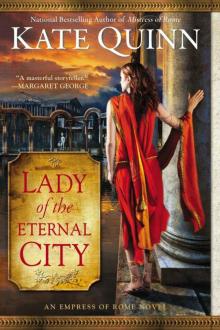 Lady of the Eternal City
Lady of the Eternal City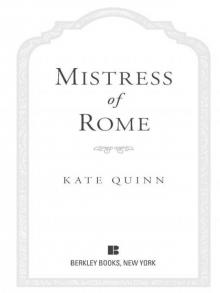 Mistress of Rome
Mistress of Rome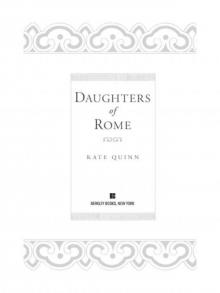 Daughters of Rome
Daughters of Rome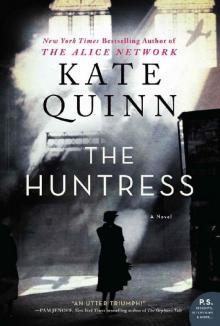 The Huntress
The Huntress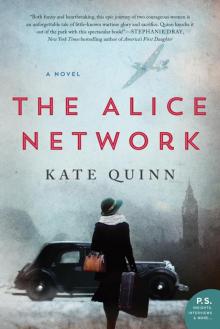 The Alice Network
The Alice Network The Lion and the Rose
The Lion and the Rose Empress of the Seven Hills
Empress of the Seven Hills The Serpent and the Pearl
The Serpent and the Pearl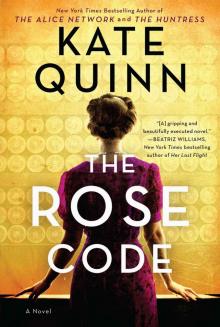 The Rose Code
The Rose Code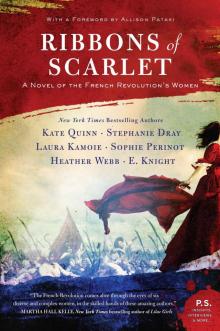 Ribbons of Scarlet
Ribbons of Scarlet A Song of War: a novel of Troy
A Song of War: a novel of Troy